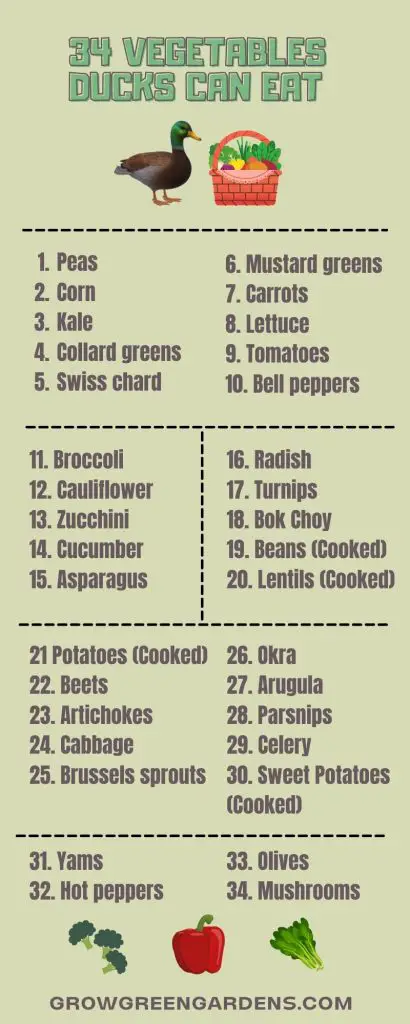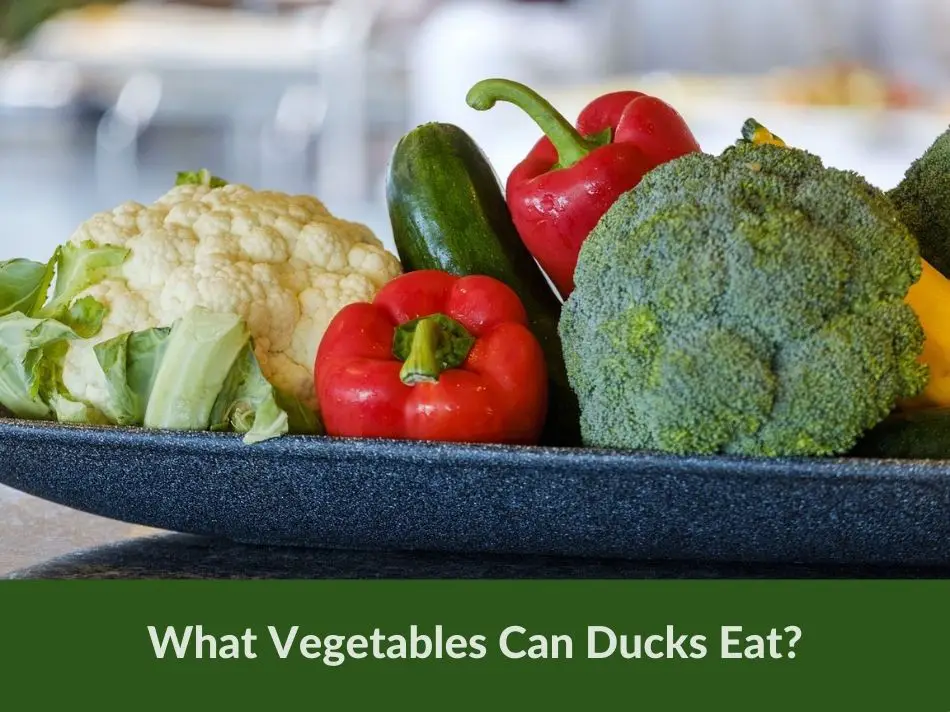Ducks are a common sight in many parks, lakes, and wetlands, charming us with their distinctive quacks and social behavior. While it’s tempting to feed ducks bread or crackers, these foods are actually not good for them. In fact, many people don’t know what kinds of food are suitable for ducks, leading to dietary imbalances that can harm these waterfowl in the long term.
So, what should we be feeding ducks? Vegetables! They play a vital role in a duck’s diet and offer nutritional benefits that go beyond the empty calories of bread.
In this article, we will delve into the dietary needs of ducks, highlighting which vegetables are a thumbs-up and which ones to avoid. Whether you’re a seasoned duck keeper or just curious, this guide aims to provide clear and concise information on duck nutrition.
Let’s dive in and discover the best vegetable choices for our feathered friends!
Healthy and Safe Vegetables Ducks Can Eat
Below is a table showing a lot of vegetables that ducks can eat. Each vegetable has a link to a more in depth guide about nutritional tips, feeding and health benefits.
| Vegetable | Information |
| Arugula | Full of antioxidants to help reverse damage to cells. |
| Artichokes | Nutritious, but it needs to be boiled and cut into smaller pieces. |
| Asparagus | Excellent source of Vitamin K and a healthy treat for ducks. |
| Bell pepper | Several amazing vitamins and minerals, making it very healthy for ducks. |
| Beets | For easier digestion, cut it into smaller pieces and serve either raw or cooked. |
| Black beans | Feed in small amounts and always boil them thoroughly because raw they contain lectins. |
| Bok Choy | An excellent treat, low in calories and contains calcium. |
| Broccoli | Great source of Vitamin K. |
| Brussel sprouts | High protein and fiber together with Vitamin C & K. |
| Cabbage | Packed with Vitamin C, making it a perfect duck snack. |
| Carrots | Low in calories, boil and cut into smaller pieces to avoid the risk of choking. |
| Cauliflower | Rich in vitamins and minerals. Can be feed raw with water. |
| Celery | Contains a high amount of vitamin K and has a rather unique taste. |
| Chickpeas | Raw chickpeas contains lectins, so always cook them before serving. |
| Collard greens | Cut into smaller pieces and always feed in moderation. |
| Corn | High in calories and should therefore be fed in moderation. |
| Cucumber | A great hydrating vegetable for hot summer days, also contain some healthy vitamins. |
| Edamame | Make sure to boil the soybeans to get rid of the lectins. Raw edamame is poisonous to ducks. |
| Green beans | Always boil them because they contain lectins. |
| Ginger | |
| Hot peppers | Perfect snack for ducks, they don’t have the same receptors for capsaicin as humans. Ducks can eat hot peppers just like any other vegetable. |
| Kale | When fed in moderation, ducks can eat kale. It still contains small amounts of oxalic acid, which can cause thinner eggshells. |
| Kidney beans | Like with other beans you have to cook these to remove the lectins, which is toxic to ducks. |
| Lentils | Raw lentils contains lectins, which are toxic to ducks. Always cook them to remove the lectins before feeding your ducks. |
| Lettuce | Romaine lettuce, little gem lettuce, butterhead lettuce, iceberg lettuce, green and red leaf lettuce and oak leaf lettuce are all great snacks for ducks. |
| Lima beans | Needs to boiled thoroughly because they contain linamarin, a toxic compound. |
| Mustard greens | Very low in calories and do contain some minerals and vitamins. |
| Mushrooms | Mushrooms edible to humans are mostly edible to ducks such as button mushrooms, oyster mushrooms, shiitake or cremini mushrooms. |
| Olives | Small amounts on rare occasions is the key for olives. They contain a high amount of salt and if possible rinse them thoroughly to remove the excess salt. |
| Okra | Best served raw in smaller pieces with water. Highly nutritious and low calories. |
| Parsnips | A bit high in carbs, but still a healthy snack contain lots of fiber. |
| Peas | Peas have the perfect balance of carbs and protein, making it a very good snack for ducks. |
| Pinto beans | They have an excellent mix of carbs, proteins and fiber making them a good treat. |
| Potatoes | Always cook the potatoes before serving. Always feed in moderation since potatoes are mostly carbs and not that nutritious. |
| Radish | Very low in calories, making them a good snack in addition to a duck’s diet. The leaves can be eaten as well. |
| Sweet Potatoes | Cook these and cut them info smaller pieces for easier digestion. High in calories and should therefore be fed in rare occasions. |
| Swiss chard | Fed in moderation. Packed with vitamins and minerals. |
| Tomatoes | Always feed ripe tomatoes. Unripe contains solanine, toxic to ducks. |
| Turnips | Organic turnips if possible to reduce the amount of chemicals. |
| Yams | Raw yams are a rough to ducks to eat so boil them before serving. High in calories and should be fed in moderation. |
| Watercress | A great source of vitamin A, vitamin C, and calcium. |
| Zucchini | Easy to digest and contains many healthy vitamins and minerals. |
Below are all the vegetables ranked from most nutritious to least for ducks. It’s crucial to note that this list is a guideline and not exhaustive. Always consult with a veterinarian who specializes in avian or waterfowl care for specific dietary needs.

Vegetables Ducks Shouldn’t Eat
Although most vegetables are healthy for humans, that is not the case for ducks. Below are some vegetables that ducks should not eat.
| Vegetable | Information |
| Eggplant | Contains alkaloids such as solanine, which in toxic to ducks. |
| Onions | Leeks, Garlic and Chives also contains thiosulfate, which is toxic to ducks. |
| Rhubarb & Spinach | Both Spinach and rhubarb contains oxalic acid, which is harmful to ducks because it binds to essential minerals like calcium, leading to nutrient deficiencies and potential kidney damage. |
| Raw potatoes | Green and raw potatoes contains solanine, which is toxic to ducks. |
| Unripe tomatoes | Tomatoes also belongs to the nightshade family and unripe tomatoes also contains solanine. |
| Uncooked beans | Raw beans contains lectins, which can be toxic to ducks. |
Tips When Feeding Ducks Vegetables
Whether you have ducks in your backyard or enjoy feeding them at local ponds, it’s essential to ensure they receive a nutritious and balanced diet. Vegetables can be a great addition to a duck’s diet, but there are some guidelines to follow as listed below.
1. Understand the Nutritional Needs of Ducks
Ducks are omnivores, which means they eat both plant and animal matter. In the wild, their diet consists of aquatic plants, small fish, insects, and even small amphibians. Vegetables can provide essential vitamins, minerals, and fiber that can be beneficial for ducks.
2. Always Use Fresh, Organic Vegetables
Whenever possible, choose fresh, organic vegetables. These are free from harmful pesticides and chemicals that can be detrimental to ducks. Wash the vegetables thoroughly to remove any residual dirt or contaminants.
3. Chop or Shred Vegetables
To make it easier for ducks to eat and digest, chop or shred the vegetables into bite-sized pieces. This also ensures that younger or smaller ducks can safely consume the vegetables.
4. Always Provide Fresh Water
Whenever you feed ducks, whether it’s their regular diet, vegetables, or any other treats, it’s imperative to ensure they have access to fresh, clean water. Ducks use water not only for hydration but also to help them swallow and digest their food. Without water, there’s a risk of food becoming lodged in their throats, leading to potential choking hazards.
Additionally, ducks have a natural behavior of dabbling, where they submerge their bills and heads in water to filter out food. This process also helps in cleaning their nostrils and eyes. Therefore, always have a shallow container or pond of water nearby when feeding them.
This not only aids in their digestion but also allows them to indulge in their natural behaviors, ensuring their overall well-being.
5. Limit the Amount
While vegetables are nutritious, they shouldn’t make up the entirety of a duck’s diet. Offer vegetables as a supplement to their primary food source, ensuring they still get adequate protein and other essential nutrients.
6. Monitor for Any Adverse Reactions
After introducing a new vegetable, observe the ducks for any signs of distress or discomfort. If a particular vegetable seems to cause digestive issues or any other adverse reactions, discontinue feeding that item
7. Consult with a Veterinarian
If you’re unsure about a particular vegetable or notice any health issues with your ducks, consult with a veterinarian. They can provide guidance tailored to your specific situation.
Conclusion
Feeding ducks vegetables can be a delightful experience, both for the ducks and those offering the treats. By following the guidelines above, you can ensure that the ducks receive a nutritious supplement to their diet while also enjoying the benefits of human interaction.
I also found a very good post about edible vegetables that I can recommend over at backyardchickens.com.
Happy feeding!


